人教版英语必修三Unit3Grammar
高中英语Unit3TraveljournalSectionⅢGrammar教案新人教版必修
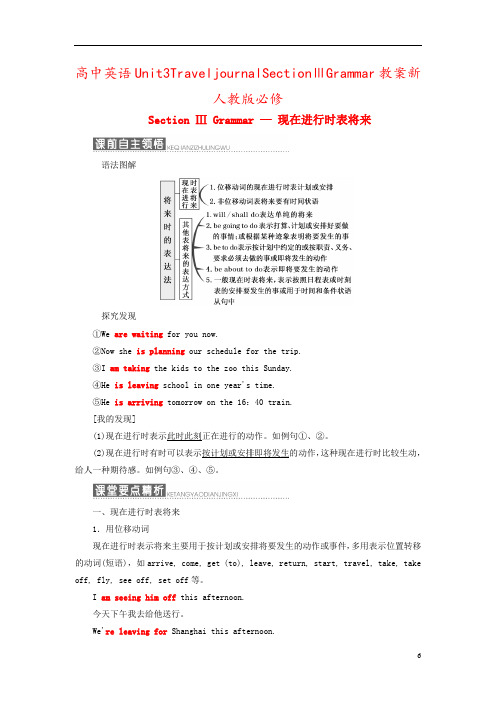
高中英语Unit3TraveljournalSectionⅢGrammar教案新人教版必修Section Ⅲ Grammar —现在进行时表将来语法图解探究发现①We are waiting for you now.②Now she is planning our schedule for the trip.③I am taking the kids to the zoo this Sunday.④He is leaving school in one year's time.⑤He is arriving tomorrow on the 16:40 train.[我的发现](1)现在进行时表示此时此刻正在进行的动作。
如例句①、②。
(2)现在进行时有时可以表示按计划或安排即将发生的动作,这种现在进行时比较生动,给人一种期待感。
如例句③、④、⑤。
一、现在进行时表将来1.用位移动词现在进行时表示将来主要用于按计划或安排将要发生的动作或事件,多用表示位置转移的动词(短语),如arrive, come, get (to), leave, return, start, travel, take, take off, fly, see off, set off等。
I am seeing him off this afternoon.今天下午我去给他送行。
We're leaving for Shanghai this afternoon.今天下午我们将动身去上海。
The plane is arriving in 10 minutes.飞机将在10分钟内到达。
[即时演练1] 补全句子①She is_leaving_for Singapore tonight.她今晚将动身去新加坡。
②When are_you_setting_off_for your holiday?你什么时候动身去度假?③His plane is_taking_off at 9:20, so he must be at the airport by 8:30.他乘坐的飞机将于9:20起飞,所以他必须在8:30之前赶到机场。
人教版必修三unit 3 Grammar
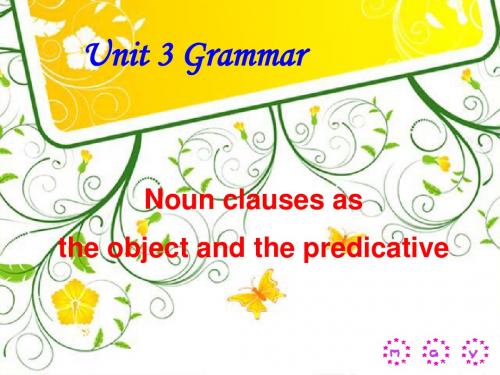
5.When did he buy this new bike? Could you tell me? → Could you tell me when
he bought this new bike? 6.My question is this: where will the lecture be given? → My question is where the lecture will be given.
8. Someone is ringing the doorbell . Go and see _______ . D
A. who is he C. who is it B. who he is D. who it is
9. Could you tell me how long __________ ? B
I have heard that he will come tomorrow .
2.如果主句是过去的时态(一般过去时,过去进行时), 从句的时态一定要用相对应的过去的某种时态
(一般过去时,过去进行时,过去将来时,过去完成时)
I knew who lived here.
I saw she was talking with her mother.
Unit 3 Grammar
Noun clauses as
the object and the predicative
什么是名词性从句?
在英语的句子结构中,本来该由名词充当的主语、宾 语、表语和同位语,由一个句子来充当,这个句子就叫 名词性从句。 主语从句 ( The Subject Clause)
上面的空大家都填对了吗?
上面每个句子都出现了的宾语 从句,大家能找到吗?
人教版高一英语必修三 unit3 grammar表语从句练习含答案
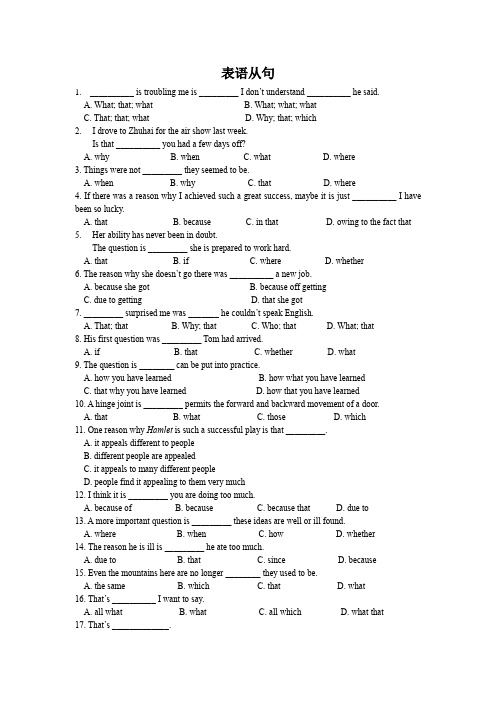
表语从句1.__________ is troubling me is _________ I don’t understand __________ he said.A. What; that; whatB. What; what; whatC. That; that; whatD. Why; that; which2. ---I drove to Zhuhai for the air show last week.---Is that __________ you had a few days off?A. whyB. whenC. whatD. where3. Things were not _________ they seemed to be.A. whenB. whyC. thatD. where4. If there was a reason why I achieved such a great success, maybe it is just __________ I have been so lucky.A. thatB. becauseC. in thatD. owing to the fact that5. ---Her ability has never been in doubt.---The question is _________ she is prepared to work hard.A. thatB. ifC. whereD. whether6. The reason why she doesn’t go there was __________ a new job.A. because she gotB. because off gettingC. due to gettingD. that she got7. _________ surprised me was _______ he couldn’t speak English.A. That; thatB. Why; thatC. Who; thatD. What; that8. His first question was _________ Tom had arrived.A. ifB. thatC. whetherD. what9. The question is ________ can be put into practice.A. how you have learnedB. how what you have learnedC. that why you have learnedD. how that you have learned10. A hinge joint is _________ permits the forward and backward movement of a door.A. thatB. whatC. thoseD. which11. One reason why Hamlet is such a successful play is that _________.A. it appeals different to peopleB. different people are appealedC. it appeals to many different peopleD. people find it appealing to them very much12. I think it is _________ you are doing too much.A. because ofB. becauseC. because thatD. due to13. A more important question is _________ these ideas are well or ill found.A. whereB. whenC. howD. whether14. The reason he is ill is _________ he ate too much.A. due toB. thatC. sinceD. because15. Even the mountains here are no longer ________ they used to be.A. the sameB. whichC. thatD. what16. That’s __________ I want to say.A. all whatB. whatC. all whichD. what that17. That’s _____________.A. where out differences lieB. our differences lie thereC. where do our differences lie C. that where out differences lie18. That is __________.A. where lived he thereB. where did he livedC. where he livedD. that where he lived19. The question is ____________.A. whether is it worth doingB. that if it is worth doingC. whether it is worth doing C. if it is worth doing20. Water will continue to be __________ it is today next in importance to oxygen.A. howB. whichC. whatD. as21. That’s __________.A. how did I become a teacherB. how I became a teacherC. how a teacher I becameD. that I became a teacher22. They are just ___________.A. that what shall I haveB. what shall I haveC. that I shall have whatD. what I shall have23. It looked ___________.A. as if it was going to rainB. that as if it was going to rainC. as if was it going to rainD. as if that it was going to rain24. That’s ____________.A. how she did itB. that how did she do itC. how did she do itD. what she did it25. That is _________ we decided to put the discussion off.A. whereB. whichC. thatD. why26. That’s ________ I lived which when I was ten years old.A. whereB. at whichC. there whereD. when27. My suggestion is ________ we should send a few comrades to help them.A. ifB. thatC. when thatD. that where28. With the development of computers, it is_________ man has suddenly become a millionaire of the mind.A. thatB. as ifC. whyD. as29. It looks ________ successful international cultural communication will make the world smaller.A. thatB. as ifC. whyD. as30. The question is __________ we shall perform the experiment.A. whichB. whereC. whoD. thatAADAD DDCBB CBDBD BACCC BDAAD ABBBB。
2021-2022学年人教版高中英语必修三教学案:Unit 5 Section 3 Word版含答案
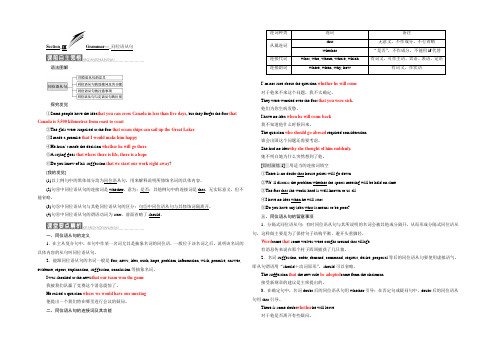
Section_ⅢGrammar—_同位语从句语法图解探究发觉①Some people have the idea that you can cross Canada in less than five days, but they forget the fact that Canada is 5,500 kilometres from coast to coast.②The girls were surprised at the fact that ocean ships can sail up the Great Lakes.③I made a promise that I would make him happy.④He hasn't made the decision whether he will go there.⑤A saying goes that where there is life, there is a hope.⑥Do you know of his suggestion that we start our work right away?[我的发觉](1)以上例句中的黑体部分均为同位语从句,用来解释说明所修饰名词的具体内容。
(2)句④中同位语从句的连接词是whether,意为:是否;其他例句中的连接词是that,无实际意义,但不能省略。
(3)句⑤中同位语从句与其他同位语从句的区分:句⑤中同位语从句与其修饰词隔离开。
(4)句⑥中同位语从句的谓语动词为start,前面省略了should。
一、同位语从句的定义1.在主从复合句中,在句中作某一名词尤其是抽象名词的同位语,一般位于该名词之后,说明该名词的具体内容的从句叫同位语从句。
2.能跟同位语从句的名词一般是fact, news, idea, truth, hope, problem, information, wish, promise, answer, evidence, report, explanation, suggestion, conclusion等抽象名词。
_新教材高中英语Unit3CONSERVTIONSectionⅢGrammar__定语从句学案
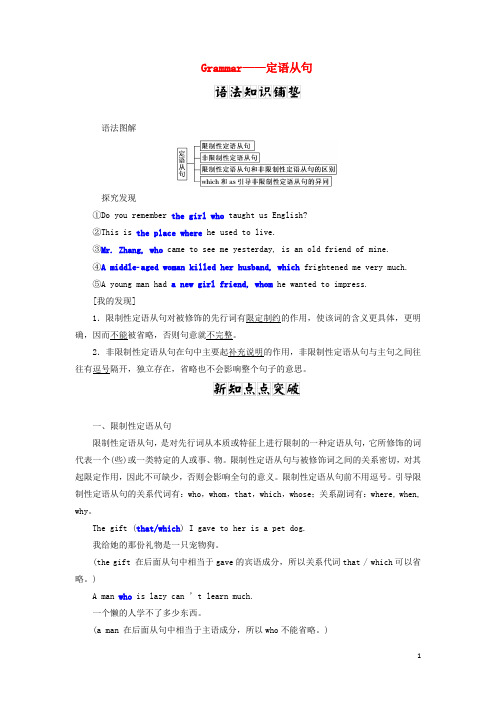
Grammar——定语从句语法图解探究发现①Do you remember the girl who taught us English?②This is the place where he used to live.③Mr. Zhang, who came to see me yesterday, is an old friend of mine.④A middleaged woman killed her husband, which frightened me very much.⑤A young man had a new girl friend, whom he wanted to impress.[我的发现]1.限制性定语从句对被修饰的先行词有限定制约的作用,使该词的含义更具体,更明确,因而不能被省略,否则句意就不完整。
2.非限制性定语从句在句中主要起补充说明的作用,非限制性定语从句与主句之间往往有逗号隔开,独立存在,省略也不会影响整个句子的意思。
一、限制性定语从句限制性定语从句,是对先行词从本质或特征上进行限制的一种定语从句,它所修饰的词代表一个(些)或一类特定的人或事、物。
限制性定语从句与被修饰词之间的关系密切,对其起限定作用,因此不可缺少,否则会影响全句的意义。
限制性定语从句前不用逗号。
引导限制性定语从句的关系代词有:who,whom,that,which,whose;关系副词有:where, when, why。
The gift (that/which) I gave to her is a pet dog.我给她的那份礼物是一只宠物狗。
(the gift 在后面从句中相当于gave的宾语成分,所以关系代词that / which可以省略。
)A man who is lazy can ’t learn much.一个懒的人学不了多少东西。
(a man 在后面从句中相当于主语成分,所以who不能省略。
2021-2022学年人教版高中英语必修三教学案:Unit 4 Section 3 Word版含答案

Section_ⅢGrammar—主语从句语法图解探究发觉①What it was to become was uncertain until between 4.5 and 3.8 billion years ago when the dust settled into a solid globe.②The earth became so violent that it was not clear whether the shape would last or not.③What is even more important is that as the earth cooled down, water began to appear on its surface.④It was not immediately obvious that water was to be fundamental to the development oflife.⑤What many scientists believe is that the continued presence of water allowed the earth to dissolve harmful gases and acids into the oceans and seas.⑥So whether life will continue on the earth for millions of years to come will depend on whether this problem can be solved.[我的发觉](1)以上黑体部分在句中作主语。
(2)①句中的what在从句中作表语,但⑤句中的what在从句中作宾语;③句中的what在从句中作主语。
(3)②⑥句中的whether意为:是否。
(4)④句中it是形式主语,真正的主语是后面that引导的从句。
人教版高中英语必修三Unit3-Grammar.ppt

What we need are more English
dictionaries.
一、Object Clauses 宾语从句
I know him . (简单句)
主语 谓语 宾语
I know who he is . (复合句)
主语 谓语 连词 从句主语 从句谓语
{I don’t know about the man, Mr. White.
同位语 I don’t know about the fact that he is a teacher.
什么叫名词性从句?
在句子中起名词作用的句子叫名词从句。 (Noun Clauses)
名词从句的功能相当于名词词组, 它在 复合句中能担任主语、宾语、表语、同 位语等。
主句
宾语从句
宾语从句的概念: 宾语从句在复合句中作主句的宾语。
句子结构: 主句+连词(引导词)+宾语从句
1. 连词(引导词) 1) 当宾语从句是陈述句时(包括肯定句和
否定句), 连词由that引导, 因为that在从句 中不作任何成分, 也没有任何具体意思, 因此在口语或非正式文体中常省略。 Lin Tao feels (that) his own team is even better. She says (that) she won’t take part in the sports meeting next Sunday. Jim thought (that) the train was like a big moving party.
6. My question is this: where will the lecture be given? →
人教版高中英语必修三Unit3grammar
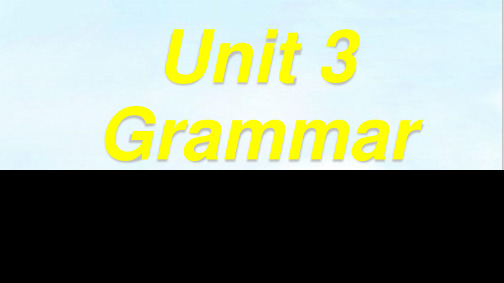
• S+V+O1+O2 • Tom gave me an apple. • S+V+O+OC • Tom made me happy.
Who are they?
They are Fei Junlong
and Nie Haisheng.
——马尔顿78、读一切好书,就是和许多高尚的人谈话。 29、如果惧怕前面跌宕的山岩,生命就永远只能是死水一潭 30、没有灯的小路一样可以行走,只要心还在。 ——朱熹59、我的努力求学没有得到别的好处,只不过是愈来愈发觉自己的无知。 ——裴斯泰洛齐68、决定一个人的一生,以及整个命运的,只是一瞬之间。 ——歌德15、最具挑战性的挑战莫过于提升自我。 (2) I find the novel _____________________. ---What do you see?
(1) We made him ___c_h_a_i_r_moafnour Students’ Union. (2) I find the novel _____________________. (3) Please tell the studenitnst_er_e_s_t_in_g__a_n_d_e_x_c_i_ti.ng (4) His funny story made us __t_o__k_e_ep_.quiet (5) I am often kept _______ all dalayulgohng on Sunday.
联合句子
He isn’t my friend.
He isn’t my classmate, either.
He is neither my friend nor my classmate.
- 1、下载文档前请自行甄别文档内容的完整性,平台不提供额外的编辑、内容补充、找答案等附加服务。
- 2、"仅部分预览"的文档,不可在线预览部分如存在完整性等问题,可反馈申请退款(可完整预览的文档不适用该条件!)。
- 3、如文档侵犯您的权益,请联系客服反馈,我们会尽快为您处理(人工客服工作时间:9:00-18:30)。
时不用if.
1. I asked her _if_/_w__h_e_t_h_e_r she had a bike. 2. _W_h__e_th_e__r we will hold a party in the open
air tomorrow depends on the weather. 3. We’re worried about _w__h_e_t_h_e_r he is safe. 4. I don’t know _w__h_e_th__e_r_/_if_ he is well or not. 5. I don’t know _w_h_e__th_e_r_ or not he is well. 6. The question is _w_h__e_th_e_r_ he should do it. 7. The doctor can hardly answer the question
Alicia Wang
在复合句中起名词作用的从句叫名词性从 句(Noun Clauses)。名词性从句的功能相 当于名词或名词词组, 它在复合句中能担
任主语、宾语、表语、同位语、介词宾语
等,因此根据它在句中不同的语法功能,
名词性从句又可分别称为主语从句、宾语 从句、表语从句和同位语从句。
{His job is important. What he does is important. This is his job.
1. I don’t think __(t_h_a_t_)_ she is coming. 2. It is a pity __t_h_a_t__ he has made such a
mistake. 3. The reason is ___th_a_t__ he is careless. 4. The news __t_h_a_t__ our team won the
that / what 1. _W__h_a_t_ he wants is a book. 2. _T_h_a_t__ he wants to go there is obvious. 3. The result is __t_h_a_t _ we won the game. 4. This is _w__h_a_t we want to know. 5. Is _w_h_a_t_ he told us true? 6. We should pay attention to _w__h_a_t_ the
_w_h_e__th_e_r_ the old man will recover soon. 8. I haven’t decided w__h_e_t_h_e_r to go there.
其它连接代词和副词的使用
主要根据名词性从句中的具体意义, 正确的选择 who, which, when, where, why, how 等连接词,这些连接词既具 有疑问含义,又起连接作用,同时在 从句中充当各种成分。
2. I don’t know whether/if he will come tonight.
3. I doubt if /whether you will keep your promise.
3个句子中的连词that, whether, if (是否)在名词性从句 中只起连接作用,在句中不担任成分,被称为连接词。
Could you tell me where he lives? ( T ) Could you tell me where does he live? ( F )
二、名词性从句连接词的选用
(1) that 和what 的选用
that 和 what 都可引导所有的名词性 从句。但是,what除起连接作用外, 还在名词性从句中充当成分,可作从 句的主语、宾语、或表语。而that在 名词性从句中不充当任何成分,只起 连接作用。
他说他已离开家乡十年了。
He told me he had been away from his
_h_o_m_e_t_o_w_n__f_o_r_t_en__y_e_a_r_s_____________.
老师告诉我们光是沿直线运行的。
The teacher told us _li_g_h_t_t_ra_v_e_l_s_i_n_a__s_tr_a_i_g_h_t_l_in_e_.
主语从句
主语从句就是从句在主句中作主语的名 词性从句。
同位语从句在句中充当同位语成分,其一般跟 在一些抽象名词(idea; belief; fact; truth; problem; news等)后面,对名词作进一步解释 说明。
同位语从句常用that引导或用连接副词when / where / why / how / whether
teacher is saying. 7. I have no doubt _t_h_a_t_ he will come. 8. I have no idea w__h_a_t he did that afternoon.
不能使用if 的情况:
a. 主语从句 b. 表语从句 c. 同位语从句 d. 介词后的宾语从句 e. whether to do 做动词宾语不能用if to
宾语从句在句中充当宾语成分(可以作谓语动词、 介词、不定式等非谓语动词的宾语)
that, whether, if (that常可省略) who, what, which, whoever, whatever, when where why how
1. whether和if都可以引导宾语从句
当whether后紧跟or/or not时,不用if. I don’t know whether I will stay or not.
我们何时举行运动会还没有决定。 _W__h_e_n_ we shall hold our sports meeting is not decided. 我不知道昨天谁打破了玻璃。 I don’t know __w__h_o___ broke the glass yesterday. 我不知道他长的什么样子。
注意: A. that 本身无意义,在宾语从句中可以省略, 但在别的三种名词性从句中不可以省略。B. whether 和if有是否的意义,在宾语从句中二者通常可以互换。 但whether 可以用于所有的四种名词性从句,而if 仅可 以用于宾语从句。
一、名词性从句的语序
(1) 名词性从句构成有两种 a. That + 陈述句 That light travels in straight lines is known to all. b. 疑问词+句子的剩余成分 This is what we are looking for.
Tell the function of the following clauses.
They know that the habit will kill them. It all depends on whether they will support us. He asked how much I paid for the violin. He made it clear to the public that he did an important and necessary job. I find it necessary that we should do the homework.
1. 如果主句时态是现在时或将来时, 从句谓语可根据句意需要而选用任 一种时态。
a.他相信他的梦想总有一天会实现的。
He believes _h_is__d_r_e_a_m__w_i_ll_c_o_m__e_t_r_u_e_s_o_m__e_d_a_y__ .
b.请告诉我你昨天这个时候在干什么。
Please tell me what you were doing _a_t_t_h_is_t_i_m_e__y_e_st_e_r_d_a_y_____________ .
match inspired us. 5. I don’t think it necessary _t_h_a_t_ you
should read English aloud. 6. He told me _(_th_a_t_)_ his father had died
and _t_h_a_t_ he had to make a living alone.
2. 如果主句谓语是过去时,从句谓语动词一般用过 去的某种时态,但从句表达的是客观事实、真理、 自然规律等时,从句谓语通常用一般现在时。
他告诉我他正在为考试做准备。
He told me _h_e_w__a_s_p_r_e_p_a_r_in__g_f_o_r_t_h_e_e_x_a_m__in_a_t_i_o_n_.
that / whether / as if / as though (if不 引导表语从句) who / whom / whose / which / what
when / where / why / how / because
分析下列宾语从句中的连词
1. I don’t doubt (that) you will succeed.
{This is what he does every day.
{ I don’t like his job. I don’t like what he does every day.
I don’t know about the man, Mr.
{ White. I don’t know about the fact that he is a teacher.
(2) 疑问词引导的名词性从句要求使用陈述 句语序,不能用一般疑问句语序。
他是怎么成功的仍然是个谜。 How was he successful is still a puzzle. ( F ) How he was successful is still a puzzle. ( T )
